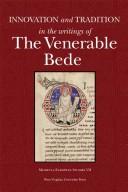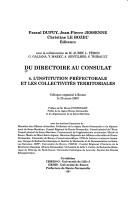| Listing 1 - 6 of 6 |
Sort by
|
Book
ISBN: 9780521514958 0521514959 9780521730730 0521730732 1139002910 1139801031 9781139002912 Year: 2010 Volume: *139 Publisher: Cambridge Cambridge University Press
Abstract | Keywords | Export | Availability | Bookmark
 Loading...
Loading...Choose an application
- Reference Manager
- EndNote
- RefWorks (Direct export to RefWorks)
"The introduction of Christianity affected the organisation of power. A comparable development is seen most powerfully in the career of Wilfrid: the church had produced a new kind of potentate, an ecclesiastical one, with a status and influence transcending the boundaries of a single kingdom"--Provided by publisher.
Bede the Venerable --- Church history --- Civilization, Anglo-Saxon --- Eglise --- Civilisation anglo-saxonne --- Histoire --- Bede, --- 2 BEDA VENERABILIS --- Godsdienst. Theologie--BEDA VENERABILIS --- Baeda Venerabilis, --- Beda, --- Beda Venerabilis, --- Bedanus, --- Venerable Bede, --- 2 BEDA VENERABILIS Godsdienst. Theologie--BEDA VENERABILIS --- Languages & Literatures --- English --- Greek & Latin Languages & Literatures --- English Literature --- Beda venerabilis --- Bede, - the Venerable, Saint, - 673-735 --- Bède le Vénérable (saint ; 0673?-0735) --- Caractère national anglais --- Prédication --- Biographies --- Influence --- Résidences et lieux familiers --- Moyen âge

ISBN: 1933202092 9781933202099 1935978292 Year: 2006 Volume: 7 Publisher: Morgantown : West Virginia University Press,
Abstract | Keywords | Export | Availability | Bookmark
 Loading...
Loading...Choose an application
- Reference Manager
- EndNote
- RefWorks (Direct export to RefWorks)
Church history --- Eglise --- Histoire --- Bede, --- Northumbria (England : Region) --- Northumbrie (Angleterre : Région) --- Sources --- Histoire religeuse --- Christianity --- Middle Ages, 600-1500 --- Baeda Venerabilis, --- Beda, --- Beda Venerabilis, --- Bedanus, --- Venerable Bede, --- Church history. --- 2 BEDA VENERABILIS --- 2 BEDA VENERABILIS Godsdienst. Theologie--BEDA VENERABILIS --- Godsdienst. Theologie--BEDA VENERABILIS

ISBN: 9781846310010 1846310016 1846312647 Year: 2006 Volume: 47 Publisher: Liverpool Liverpool university press
Abstract | Keywords | Export | Availability | Bookmark
 Loading...
Loading...Choose an application
- Reference Manager
- EndNote
- RefWorks (Direct export to RefWorks)
Bible. --- Commentaries --- Early works to 1800. --- 222.7 --- Kronieken. Ezra. Nehemia --- Bede, --- Criticism, interpretation, etc. --- Bible --- Ouvrages avant 1800
Book
ISBN: 9781789620900 1789620902 9781789621228 1789621224 1802071040 Year: 2019 Publisher: Liverpool Liverpool University Press
Abstract | Keywords | Export | Availability | Bookmark
 Loading...
Loading...Choose an application
- Reference Manager
- EndNote
- RefWorks (Direct export to RefWorks)
The Old Testament book 1 Samuel (known as 1 Kings in modern Bibles) contains one of the most dramatic stories in the Old Testament, with its tense narrative about Israel's first attempts to govern itself by kingship, and a cast of famous characters who drive the story -- the priest and prophet Samuel, the tragic figure of King Saul, and chiefly David himself, the youngest son of Jesse, who slays the Philistine's champion, Goliath, and gains God's favour in replacement for Saul. The Venerable Bede (672-735 AD), Anglo-Saxon England's foremost interpreter of the Bible, wrote many commentaries on the Old Testament, but his treatment of 1 Samuel stands out in particular: it is one of his longest commentaries, one of his first sustained attempts to deal with the Old Testament without support from an earlier commentary, and one of the few commentaries he wrote that can be dated precisely. Bede sets out to read the story of 1 Samuel as full of details which demonstrate the prophetic nature of Old Testament history, an attempt that is boldly experimental in its application of the allegorical method of interpretation. Historically, the commentary is of special interest for its detailed reference to the departure of Abbot Ceolfrith from Wearmouth-Jarrow in June 716 AD, which has allowed scholarship to firmly date the work and explore some potential links to the turbulent political scene in Northumbria that marked that decade. This English translation is the first rendering of the Latin into another language. The translation is preceded by a substantial introduction that places the work in the context of Bede's oeuvre, discusses his sources and exegetical methods, and offers a reading of the work's contemporary context in the light of current scholarly debate.
Bede, --- Bible. --- 2 BEDA VENERABILIS --- 222.6 --- 222.6 Livres de Samuel. Les Rois. David. Salomon. Elia. Elisa. Josias --- 222.6 Samuelboeken. Boeken der koningen. David. Salomon. Elia. Elisa. Josias --- Livres de Samuel. Les Rois. David. Salomon. Elia. Elisa. Josias --- Samuelboeken. Boeken der koningen. David. Salomon. Elia. Elisa. Josias --- 2 BEDA VENERABILIS Godsdienst. Theologie--BEDA VENERABILIS --- Godsdienst. Theologie--BEDA VENERABILIS --- First Kings (Book of the Vulgate Old Testament) --- First Samuel (Book of the Old Testament) --- Kings, 1st (Book of the Vulgate Old Testament) --- O.T. Shemuʼel Alef (Book of the Old Testament) --- Shemuʼel 1 (Book of the Old Testament) --- Shemuʼel A. (Book of the Old Testament) --- Shemuʼel Alef (Book of the Old Testament) --- Christian literature --- Latin literature
Book
ISBN: 9782503565040 9782503565668 2503565042 2503565662 Year: 2020 Volume: 46 Publisher: Turnhout: Brepols,
Abstract | Keywords | Export | Availability | Bookmark
 Loading...
Loading...Choose an application
- Reference Manager
- EndNote
- RefWorks (Direct export to RefWorks)
"This book honours the scholarship of English historian Dr. Alan Thacker by exploring the insular, the European and, more broadly, the Mediterranean connections and contexts of the history and culture of Anglo-Saxon England in the age of Bede, and beyond. It brings together original contributions by leading European and North American scholars of Late Antiquity and the early Middle Ages working across a range of disciplines: history, theology, epigraphy, and art history. Moving from the Irish Sea to the Bosporus, this collection presents a linked world in which saints, scholars, and the city of Rome all played powerful connective roles, creating communities, generating relationships, linking east to west, north to south, and present to past."--Publisher's description.
Thacker, Alan --- 27 <82> --- 27 <82> Histoire de l'Eglise--Argentinië --- 27 <82> Kerkgeschiedenis--Argentinië --- Histoire de l'Eglise--Argentinië --- Kerkgeschiedenis--Argentinië --- Festschrift - Libri Amicorum --- Cities and towns, Medieval --- Communities --- Christian saints --- Social networks --- History --- Great Britain --- History. --- Saints --- Middle Ages, 500-1500 --- Cities and towns, Medieval - Europe. --- Communities - Europe - History - To 1500. --- Saints - History - To 1500. --- Social networks - Europe - History - To 1500. --- Moyen Age --- Beda venerabilis --- Great Britain - History - Anglo-Saxon period, 449-1066.


ISBN: 2490296027 2905637331 2905637390 2905637781 9782905637390 2905637404 2905637412 9782905637338 Year: 2012 Volume: 20 ; 22 Publisher: Villeneuve d'Ascq : Publications de l’Institut de recherches historiques du Septentrion,
Abstract | Keywords | Export | Availability | Bookmark
 Loading...
Loading...Choose an application
- Reference Manager
- EndNote
- RefWorks (Direct export to RefWorks)
En juillet 2002, les meilleurs spécialistes mondiaux de Bède le Vénérable (c. 670-735) se sont retrouvés à Lille et à Amiens pour dresser un bilan des études relatives à l'oeuvre et à la postérité du grand écolâtre anglo-saxon, et pour ouvrir sur elles de nouvelles perspectives de recherches. Venus de Grande-Bretagne, d'Irlande, du Canada, des États-Unis, du Japon, d'Italie, d'Allemagne, de Belgique et de France, ils ont passé trois jours à exposer leurs travaux, à écouter, à échanger, dans une athmosphère à la fois studieuse et confraternelle. Les organisateurs du colloque sont heureux de publier aujourd'hui les principaux résultats de ces fructueuses journées. Presque toutes les communications qui y ont été faites sont ici réunies, augmentées de quelques contributions originales que leurs auteurs n'avaient pu présenter en juillet 2002. Les unes et les autres ont été regroupées sous cinq titres dans lesquels on retrouvera, à quelques nuances près, le découpage initial du projet : 1. Bède et ses sources ; 2. Bède, l'exégète ; 3. Un historien en son milieu ; 4. La postérité de Bède ; 5. Les traductions de Bède. De cette harmonieuse polyphonie se dégage l'image d'un érudit qui, bien loin de se limiter à celle de l'ascète coupé du monde, rigoureux, voire rigoriste, qui a longtemps été mise en avant, montre un homme engagé, souvent indulgent à l'égard de mouvements ou de tendances ecclésiales peu orthodoxes, et toujours soucieux de réformer l'Église et la société de l'Angleterre de son temps. Pour y parvenir, il est allé puiser ses arguments dans des traditions testamentaires, patristiques et historiographiques dans lesquelles il a opéré un choix souvent original, et qui expliquent aussi bien le caractère unique que la portée universelle de son oeuvre.
France --- History --- Politics and government --- Histoire --- Politique et gouvernement --- Bede, --- Beda venerabilis --- Bede, - the Venerable, Saint, - 673-735 --- Consulat --- Révolution française --- Directoire --- Medieval & Renaissance Studies --- Moyen Âge --- église --- Bède --- Angleterre --- écclésiaste --- écclésiastique
| Listing 1 - 6 of 6 |
Sort by
|

 Search
Search Feedback
Feedback About UniCat
About UniCat  Help
Help News
News